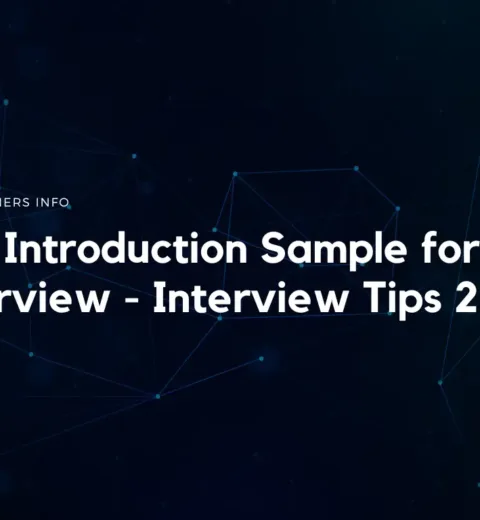Table of Contents
Here are the details for finding your first job with jobsearchers
Embarking on the journey to secure your first internship or job is a pivotal moment, shaping the trajectory of your career. The significance of this initial step cannot be overstated, as it lays the foundation for future professional growth. In this comprehensive guide, we will navigate through the essential elements, offering valuable insights into crafting compelling resumes, writing impactful cover letters, building impressive portfolios, preparing for interviews, and initiating effective networking strategies tailored for beginners.
Crafting an Impressive Resume
In the competitive realm of job hunting, your resume acts as a powerful self-marketing tool. Its role goes beyond mere documentation; it is a narrative of your professional journey.
Highlighting Key Elements
When structuring your resume, strategically place emphasis on key elements such as education, skills, and experiences. Use vivid language and action verbs to vividly portray your accomplishments and responsibilities.
- Education: Clearly list your educational background, including degrees, majors, and relevant coursework.
- Skills: Create a dedicated section showcasing both technical and soft skills, aligning them with the job requirements.
- Experiences: Detail your work experiences, emphasizing achievements and quantifiable results.
Tailoring it to the Specific Job
Resist the temptation of a one-size-fits-all approach. Customize your resume for each application, meticulously aligning your experiences and skills with the specific requirements of the job in question.
- Keywords: Integrate keywords from the job description to pass through applicant tracking systems (ATS).
- Relevance: Prioritize experiences and skills relevant to the specific role to capture the recruiter’s attention.
- Quantify Achievements: Use metrics and numbers to quantify your achievements for added impact.
Writing an Effective Cover Letter
The cover letter is not a mere formality; it’s an opportunity to add a personal touch to your application, giving employers a glimpse into your personality and motivations.
Importance and Purpose
Delve into the significance of the cover letter as more than just an introduction. It serves as a platform to articulate why you are the ideal candidate, aligning your skills and aspirations with the ethos of the prospective employer.
- Storytelling: Craft a narrative that complements your resume, providing context to your professional journey.
- Highlight Fit: Explicitly state why you are a perfect fit for the company, demonstrating a genuine interest in their mission.
Tips for Personalization
Elevate your cover letter from generic to impactful by addressing the hiring manager by name, if possible. Tailor the content to resonate with the company’s culture and values, showcasing a genuine interest in the role.
- Research: Conduct thorough research on the company’s culture, values, and recent projects.
- Connect Personally: Share a personal anecdote that connects your experiences to the company’s mission.
- Mirror Language: Use language from the company’s website or recent publications to mirror their tone.
Building a Professional Portfolio for finding your first job
Beyond the confines of a resume, a professional portfolio is a dynamic showcase of your skills and accomplishments, offering tangible evidence of your capabilities.
Showcasing Skills and Projects
Diversify your portfolio with a rich array of projects that provide a multifaceted view of your abilities. Accompany each project with concise yet illuminating descriptions to offer context to potential employers.
- Project Variety: Include diverse projects that showcase different skills and competencies.
- Descriptions: Craft compelling project descriptions, emphasizing your role, challenges faced, and outcomes achieved.
- Visual Appeal: Ensure your portfolio is visually appealing, with clear organization and easy navigation.
Online Presence
Extend your professional footprint by creating an online portfolio or website. This digital extension not only amplifies your visibility but also affords employers the convenience of accessing your work with ease.
- Website Development: Consider creating a personal website to host your portfolio and provide additional information about yourself.
- SEO Optimization: Optimize your online portfolio with relevant keywords to enhance discoverability.
- Consistency: Maintain consistency in your online presence, aligning it with your resume and cover letter.
Interview Preparation Tips
Embarking on an interview unprepared is akin to sailing into uncharted waters without a compass. Research and preparation are your navigational tools.
Read how to answer the question “Introduce yourself”
Researching the Company
Before entering the interview room, delve into the intricacies of the company’s values, mission, and recent achievements. Tailor your responses to reflect a deep understanding of what makes the company tick.
- Company History: Familiarize yourself with the company’s history, major milestones, and any recent news.
- Industry Trends: Stay abreast of current trends and challenges within the industry to showcase your awareness.
- Employee Perspectives: Read employee reviews or testimonials to gain insights into the company culture.
Common Interview Questions and How to Answer Them
Anticipate and prepare responses to common interview questions. The art lies not just in answering but in crafting responses that accentuate your strengths and experiences, leaving a lasting impression.
- Behavioral Questions: Prepare anecdotes for behavioral questions, emphasizing your problem-solving and teamwork skills.
- Situational Questions: Develop responses for situational questions, showcasing your ability to navigate challenges.
- Questions for the Interviewer: Prepare thoughtful questions to ask the interviewer, demonstrating your genuine interest.
Networking Strategies for Beginners
Networking is the conduit that can bridge the gap between opportunity and aspiration. Whether you’re an introvert or extrovert, effective networking is a skill that can be cultivated.
Importance of Networking
Understand the pivotal role networking plays in the professional landscape. Building meaningful connections not only provides insights and advice but can also be a gateway to potential job leads.
- Long-Term Relationships: View networking as a long-term investment in relationships rather than a short-term gain.
- Informational Interviews: Conduct informational interviews to learn more about different career paths and industries.
- Volunteer Opportunities: Engage in volunteer opportunities or industry events to expand your network organically.
Online and Offline Networking Tips
Demystify the process of networking by actively participating in industry events, both online and offline. Engage in conversations, seek mentorship, and embrace the power of digital connections through platforms like LinkedIn.
- LinkedIn Engagement: Actively participate in LinkedIn groups, sharing insights, and connecting with professionals in your field.
- Event Attendance: Attend industry conferences, seminars, and workshops to meet professionals face-to-face.
- Elevator Pitch: Craft a concise yet compelling elevator pitch to introduce yourself at networking events.
Leveraging Social Media
In the digital age, social media is not just a personal space but a potent tool for crafting a professional brand and connecting with industry experts.
Creating a Professional Online Presence
Optimize your LinkedIn profile to reflect your professional journey cohesively. Ensure other social media accounts project a positive and consistent image.
- LinkedIn Optimization: Use a professional photo, write a compelling headline, and update your profile regularly.
- Content Sharing: Share relevant articles, industry insights, and your own professional achievements to establish credibility.
- Privacy Settings: Review and adjust privacy settings on personal accounts to maintain a professional image.
Connecting with Industry Professionals
Initiate meaningful interactions with professionals in your field. Comment on their posts, share relevant content, and send personalized connection requests to establish a genuine network.
- Personalized Connection Requests: When connecting on LinkedIn, include a personalized message expressing your interest in their work.
- Engagement: Regularly engage with their content, providing thoughtful comments and insights.
- Reciprocity: Offer assistance or share valuable resources with your network to foster reciprocity.
Utilizing Career Services
Universities and job centers offer a trove of resources that often go untapped. Leverage these services to augment your job search strategy.
Services Offered by Universities and Job Centers
Explore the comprehensive services provided by these institutions, ranging from resume workshops to mock interviews and personalized career counseling.
- Resume Workshops: Attend workshops to refine your resume, receive feedback, and stay updated on industry standards.
- Mock Interviews: Participate in mock interviews to practice and receive constructive criticism.
- Career Counseling: Seek guidance from career counselors for personalized advice on your job search strategy.
Resume Workshops and Mock Interviews
Participate actively in workshops designed to fine-tune your resume and provide a platform for simulated interviews. These experiences can significantly enhance your confidence and readiness.
- Resume Review: Use workshops to receive feedback on your resume’s content, formatting, and overall effectiveness.
- Mock Interview Preparation: Engage in mock interviews to simulate real interview scenarios, refining your responses and presentation.
- Networking Opportunities: Workshops often provide networking opportunities with industry professionals and alumni.
Internship Search Platforms
Navigating the landscape of internship and job search platforms requires a strategic approach. Understanding the nuances of each platform can significantly impact your success.
Overview of Popular Platforms
Familiarize yourself with prominent job search platforms such as LinkedIn, Indeed, and Glassdoor. Recognize their unique features and tailor your approach accordingly.
- LinkedIn: Ideal for professional networking, job searches, and staying informed about industry trends.
- Indeed: A comprehensive platform with a vast range of job postings and easy application processes.
- Glassdoor: Offers insights into company culture, salaries, and reviews from current and former employees.
How to Make the Most of Them
Optimize your profiles on these platforms, set up job alerts to stay informed, and adopt a proactive stance by actively applying to positions that align with your career goals.
- Profile Optimization: Ensure your profiles are complete, highlighting your skills, experiences, and career objectives.
- Job Alerts: Set up job alerts based on your preferences to receive timely notifications about relevant opportunities.
- Proactive Application: Don’t wait for opportunities to come to you; actively search and apply for positions aligned with your goals.
Handling Rejections
In the often tumultuous journey of job hunting, rejection is not an endpoint but a juncture for growth and refinement.
Turning Rejection into a Learning Opportunity
Seek feedback from interviews and rejected applications. Use this constructive criticism as a catalyst for improvement, honing your approach with each setback.
- Feedback Request: Politely ask for feedback from recruiters or interviewers to understand areas for improvement.
- Self-Reflection: Reflect on your experiences, identifying patterns and areas where you can enhance your skills or presentation.
- Continuous Improvement: Treat rejection as an opportunity to evolve, adapt, and continually refine your job search strategy.
Staying Persistent and Positive
Maintain a resilient mindset throughout the job search process. Celebrate small victories, surround yourself with a supportive network, and view each rejection as a step closer to your desired destination.
- Goal Setting: Set realistic short-term and long-term goals, celebrating achievements along the way.
- Support System: Lean on friends, family, or mentors for encouragement and support during challenging times.
- Mindfulness Techniques: Adopt mindfulness techniques to manage stress and stay focused on your goals.
Success Stories
Narratives of triumph over adversity can serve as beacons of inspiration, guiding you through the challenging terrain of job hunting.
Inspirational Stories of Individuals Landing Their First Job/Internship
Explore real-life success stories of individuals who faced obstacles, encountered rejection, yet emerged victorious in securing their dream opportunities. Draw motivation from their experiences.
- Persistence Pays Off: Learn from individuals who persevered through challenges, showcasing the importance of persistence.
- Adaptability: Discover stories of adaptability, where individuals adjusted their strategies in response to setbacks.
- Continuous Learning: Embrace narratives that highlight the value of continuous learning and personal growth.
Conclusion
In the labyrinth of job hunting, success is not an overnight accomplishment but the culmination of strategic planning, resilience, and continuous refinement. As you navigate the complexities of crafting resumes, writing cover letters, building portfolios, preparing for interviews, and networking, remember that each step is a progression toward your ultimate goal. Rejections are not roadblocks; they are stepping stones to success. Stay persistent, maintain a positive outlook, and continually hone your approach to ensure that your first internship or job is not just a beginning but a launchpad for future triumphs.










